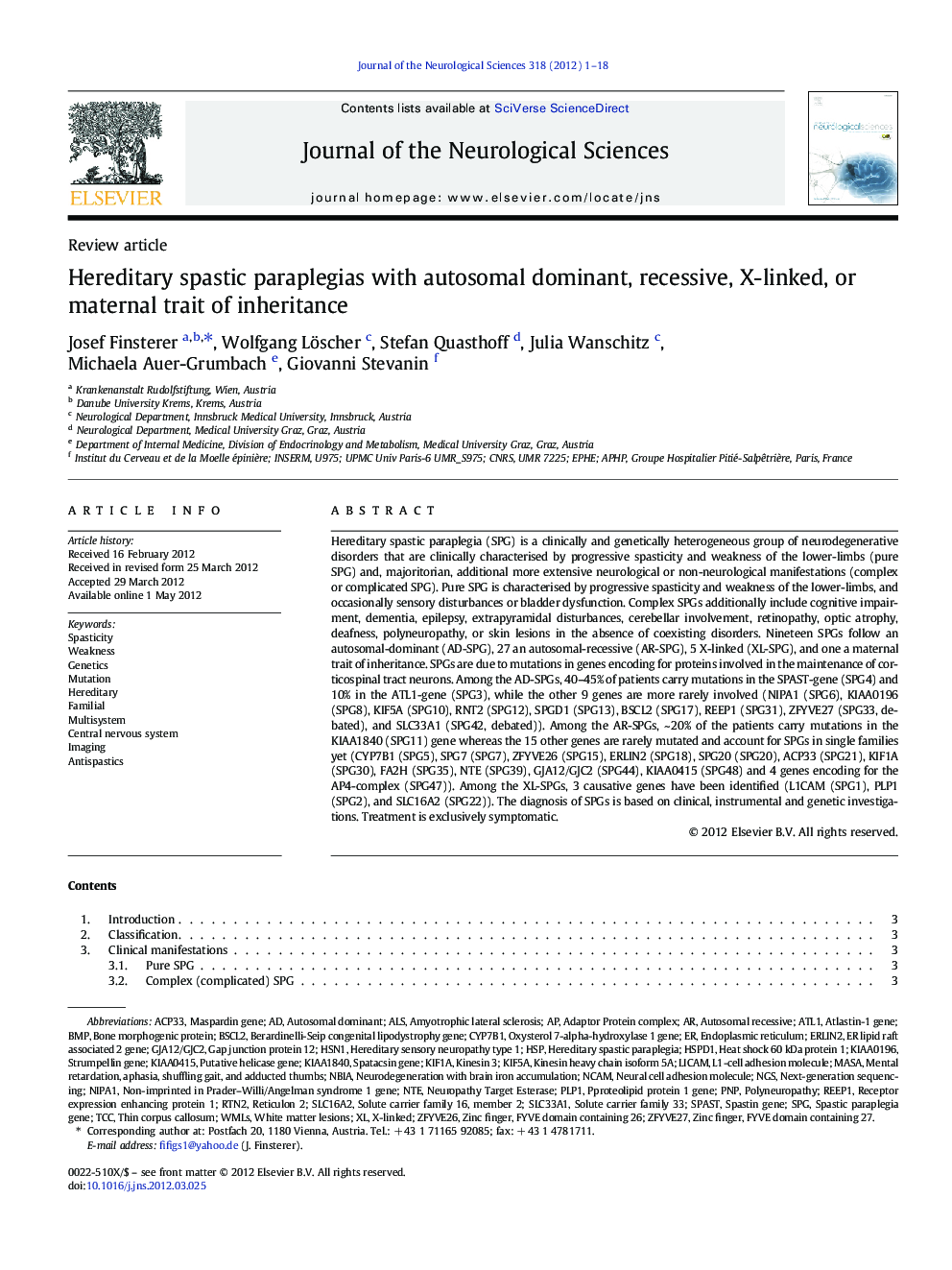| Article ID | Journal | Published Year | Pages | File Type |
|---|---|---|---|---|
| 8280783 | Journal of the Neurological Sciences | 2012 | 18 Pages |
Abstract
Hereditary spastic paraplegia (SPG) is a clinically and genetically heterogeneous group of neurodegenerative disorders that are clinically characterised by progressive spasticity and weakness of the lower-limbs (pure SPG) and, majoritorian, additional more extensive neurological or non-neurological manifestations (complex or complicated SPG). Pure SPG is characterised by progressive spasticity and weakness of the lower-limbs, and occasionally sensory disturbances or bladder dysfunction. Complex SPGs additionally include cognitive impairment, dementia, epilepsy, extrapyramidal disturbances, cerebellar involvement, retinopathy, optic atrophy, deafness, polyneuropathy, or skin lesions in the absence of coexisting disorders. Nineteen SPGs follow an autosomal-dominant (AD-SPG), 27 an autosomal-recessive (AR-SPG), 5 X-linked (XL-SPG), and one a maternal trait of inheritance. SPGs are due to mutations in genes encoding for proteins involved in the maintenance of corticospinal tract neurons. Among the AD-SPGs, 40-45% of patients carry mutations in the SPAST-gene (SPG4) and 10% in the ATL1-gene (SPG3), while the other 9 genes are more rarely involved (NIPA1 (SPG6), KIAA0196 (SPG8), KIF5A (SPG10), RNT2 (SPG12), SPGD1 (SPG13), BSCL2 (SPG17), REEP1 (SPG31), ZFYVE27 (SPG33, debated), and SLC33A1 (SPG42, debated)). Among the AR-SPGs, ~Â 20% of the patients carry mutations in the KIAA1840 (SPG11) gene whereas the 15 other genes are rarely mutated and account for SPGs in single families yet (CYP7B1 (SPG5), SPG7 (SPG7), ZFYVE26 (SPG15), ERLIN2 (SPG18), SPG20 (SPG20), ACP33 (SPG21), KIF1A (SPG30), FA2H (SPG35), NTE (SPG39), GJA12/GJC2 (SPG44), KIAA0415 (SPG48) and 4 genes encoding for the AP4-complex (SPG47)). Among the XL-SPGs, 3 causative genes have been identified (L1CAM (SPG1), PLP1 (SPG2), and SLC16A2 (SPG22)). The diagnosis of SPGs is based on clinical, instrumental and genetic investigations. Treatment is exclusively symptomatic.
Keywords
Thin corpus callosumSPGNTENBIAadaptor protein complexPLP1Bscl2MultisystemHSPD1PolyneuropathyREEP1KIF5ANIPA1CYP7B1WMLsATL1KIF1ASPASTNGSTCCNCAMHspPNPAutosomal DominantAutosomal recessiveHereditarySpasticityamyotrophic lateral sclerosisneurodegeneration with brain iron accumulationALSImagingNext-generation sequencingmutationfamilialMasacentral nervous systemendoplasmic reticulumWhite matter lesionsWeaknessBMPX-linkedneural cell adhesion moleculeneuropathy target esteraseHereditary spastic paraplegiabone morphogenic proteinGenetics
Related Topics
Life Sciences
Biochemistry, Genetics and Molecular Biology
Ageing
Authors
Josef Finsterer, Wolfgang Löscher, Stefan Quasthoff, Julia Wanschitz, Michaela Auer-Grumbach, Giovanni Stevanin,
